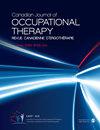Introduction to the Special Issue on Occupational Participation in Times of Adversity.
IF 1.7
3区 医学
Q2 REHABILITATION
Canadian Journal of Occupational Therapy-Revue Canadienne D Ergotherapie
Pub Date : 2023-06-01
DOI:10.1177/00084174231167273
引用次数: 0
Abstract
Over the past 2 years, we have witnessed adversity following an unprecedented variety of situations: the COVID-19 pandemic, climate disasters, and tragic consequences of systemic inequities, just to name a few. No person, group, community, or population has gone unscathed by one or more of these events, sometimes experienced simultaneously. Individuals and communities have been compelled to respond, adapt, and innovate the ways in which they engage in occupations in daily life. The occupational therapy community must consider and reflect on the impact of these adversities on occupational participation and occupational therapy practice, education, and research. In Canada, the profession is at a turning pointing with the recent release of the Promoting Occupation Participation: Collaborative relationship-focused occupational (PPO) and its new Canadian Model of Occupational Participation (CanMOP) (Egan & Restall, 2022). This new model and text deliberately shift our focus to occupational participation, emphasizing the importance of context and how it affects everyday doing. There is an explicit consideration of historical influences on current experiences of doing occupation and provision of occupational therapy services. Continually learning ways to promote occupational participation in times of adversity will influence how we practice currently and in the future. Thus, this special theme issue of the Canadian Journal of Occupational Therapy on occupational participation in times of adversity offers original articles to provide a historical record of the impact of certain events and sharing of lived experiences during trying times. Most of the papers in this issue describe lived experiences during the COVID-19 pandemic. Tao et al. (2023), Lozano et al. (2023), and Vrkljan et al. (2023) each explored impacts of the pandemic around a meaningful activity. In “Quality of Physical Activity Participation Among Individuals with Disability through Pandemic Restrictions,” Tao et al. explored the effect of COVID-19 on meaningful physical activity participation experiences by adults with disabilities, highlighting how study participants valued social support, copedwith barriers, and adjusted to situational restrictions to continue participation in physical activity, but were unable to detect explanatory factors influencing the quality of physical activity. In Lozano et al.’s “Losing Life’s Sparkle: Experiences of Canadian High-Level Choristers During the COVID-19 Pandemic,”high-level choralmusicians described significant disruptions to how they experienced participation in music-making. New ways of participating, though safer, were less satisfying and joyful as choir singers felt disconnected from each other and their audiences. This study provides unique insight on how the unsought suspension of meaningful occupation can have a negative impact on well-being. Vrkljan et al.’s (2023) “Exploring Distress and Occupational Participation among Older Canadians during the COVID-19 Pandemic” explored how community-dwelling older adults managed their daily lives under lockdown. The findings of this mixed method study describe the immediacy and depth of impact lockdown measures had on occupational participation. Furthermore, it identifies low resilience as an important risk factor for high distress and anxiety. While some older adults were able to use strategies to adapt to the unforeseen circumstances, others struggled to cope, adapt, andfindmeaningful occupations in this disrupted context. Such findings are a reminder that adversity is not experienced in the same way by all, thus supporting the necessity of a highly individualized approach to intervening around occupational participation during times of major disruption. Editorial Canadian Journal of Occupational Therapy 2023, Vol. 90(2) 120-124 DOI: 10.1177/00084174231167273“逆境时期的职业参与”特刊导论
本文章由计算机程序翻译,如有差异,请以英文原文为准。
求助全文
约1分钟内获得全文
求助全文
来源期刊
CiteScore
2.80
自引率
11.10%
发文量
46
审稿时长
>12 weeks
期刊介绍:
The Canadian Journal of Occupational Therapy was first published in September 1933. Since that time, it has fostered advancement and growth in occupational therapy scholarship. The mission of the journal is to provide a forum for leading-edge occupational therapy scholarship that advances theory, practice, research, and policy. The vision is to be a high-quality scholarly journal that is at the forefront of the science of occupational therapy and a destination journal for the top scholars in the field, globally.

 求助内容:
求助内容: 应助结果提醒方式:
应助结果提醒方式:


